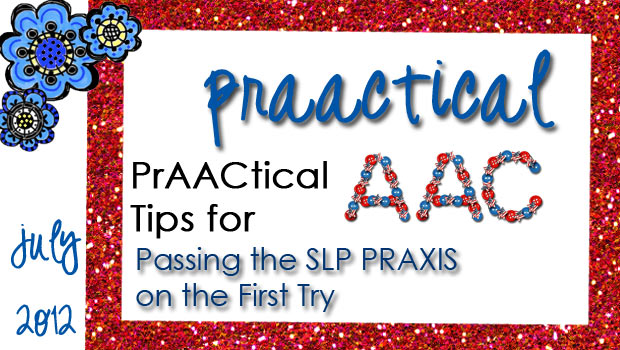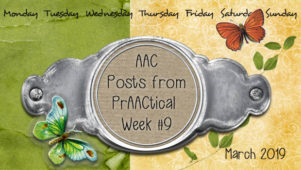PrAACtical Tips for Passing the SLP PRAXIS on the First Try, Part 3

/Praxis_wordle.png)
The SLP PRAXIS Exam: No big deal or VERY big deal? You’ll find graduate students and clinical fellows in each camp. Yes, there are lots of new grads who did well on it and swear that they hardly studied. We cheer loudly to welcome them to our ranks. There are others, however, who quietly regret not having gone the extra mile to prepare. We hate regrets, so our SLP PRAXIS prep posts are geared for those who want an extra measure of safety when they go in to take their exam.
–
In Part 1 and Part 2, we talked about getting prepared and setting a study schedule for the SLP PRAXIS. In this post, we wanted to share some resources that have been helpful to our students.
—
Online Flashcards
- There are many sites that offer the ability for users to create flashcards, use them to study, and/or print for portability. Flashcard Exchange seems to have the greatest number of flashcard sets on SLP and audiology topics. It is free to use online but to print there is a one-time fee (about $20.00 when I signed up). To use on your mobile device, you may need the Quizard app (about $3.00 and has Android and Apple versions). Other flashcard sites include Flashcard Machine, Quizlet, Study Blue, and Study Stack. As with all online sources, caveat emptor. Keep that critical thinking cap tied neatly under your chin. (The person who made the flashcard set may not be as smart or diligent as you are.)
–
Podcasts
On iTunes
- from ASHA
- from MedSLP
- from Dr. Linton Hutchinson
Elsewhere
- from the Waisman Center
–
Practice Tests
- Official ETS SLP PRAXIS Practice Test
- Sample questions from PRAXIS Speech
- Sample exam from NESPA Exam website
–
Other Materials
–
Courses
- National Black Association for Speech-Language and Hearing: Offers an workshop in conjunction with their annual conference each April
- University of South Carolina: Self study workshop on DVD
–
Remember, life will be a little more hectic while you’re reviewing for the PRAXIS, but it won’t last forever. As my grandma used to say “If you don’t have time to do it right, when will you have time to do it over again?” SLP students, you are smart, hard-working, and dedicated. You can do this! Good luck!!
–
Filed under: PrAACtical Thinking
Tagged With: flashcards, graduate students, PRAXIS, resources, SLP students, study tips, test preparation
This post was written by Carole Zangari





4 Comments
Thanks lot, this really helped me.
So glad that it was helpful. The SLP has been revised since I first wrote this post, but much of the information is still applicable.
Hi there, I have found your blog very helpful! I am 3 weeks away from the Praxis exam (insert anxiety attack here)! I just took the ETS practice exam for the first time. I am a little confused as to how to interpret my score. I realize that the scoring has changed since you have taken it. It is now based on a scale of 200 (standard score), with 162 being the passing score. I have read on other blogs that people are given a “raw score” when they complete the test, with that based on a scale of 108. For example one girl posted she was given a raw of 72, and passed. Was this the case for you? And is the raw score basically how many you got right? Is this how I interpret my practice exam? I am kinda bummed about it, I got 83 correct out of 132…not sure how this plays out but it seems rather low. Any help will be appreciated!
xoxo-
Jenna
Jenna, in general, one question answered correctly is worth one raw point. There are multiple versions of the test, but they all use selected response (multiple choice) questions so the way they are scored is the same. A raw score of 72 seems a little low to pass. A raw score of 74 out of 108 questions (69%) converts to a scaled score of 162. Your score of 83/132 is 63% so you are right to a little concerned. To get it up to the 69% range, you may want to take as many practice tests as possible and work to analyze your errors. I assume you have some review books that offer practice tests, but, if not, you may want to get those. The new Lof book is excellent.